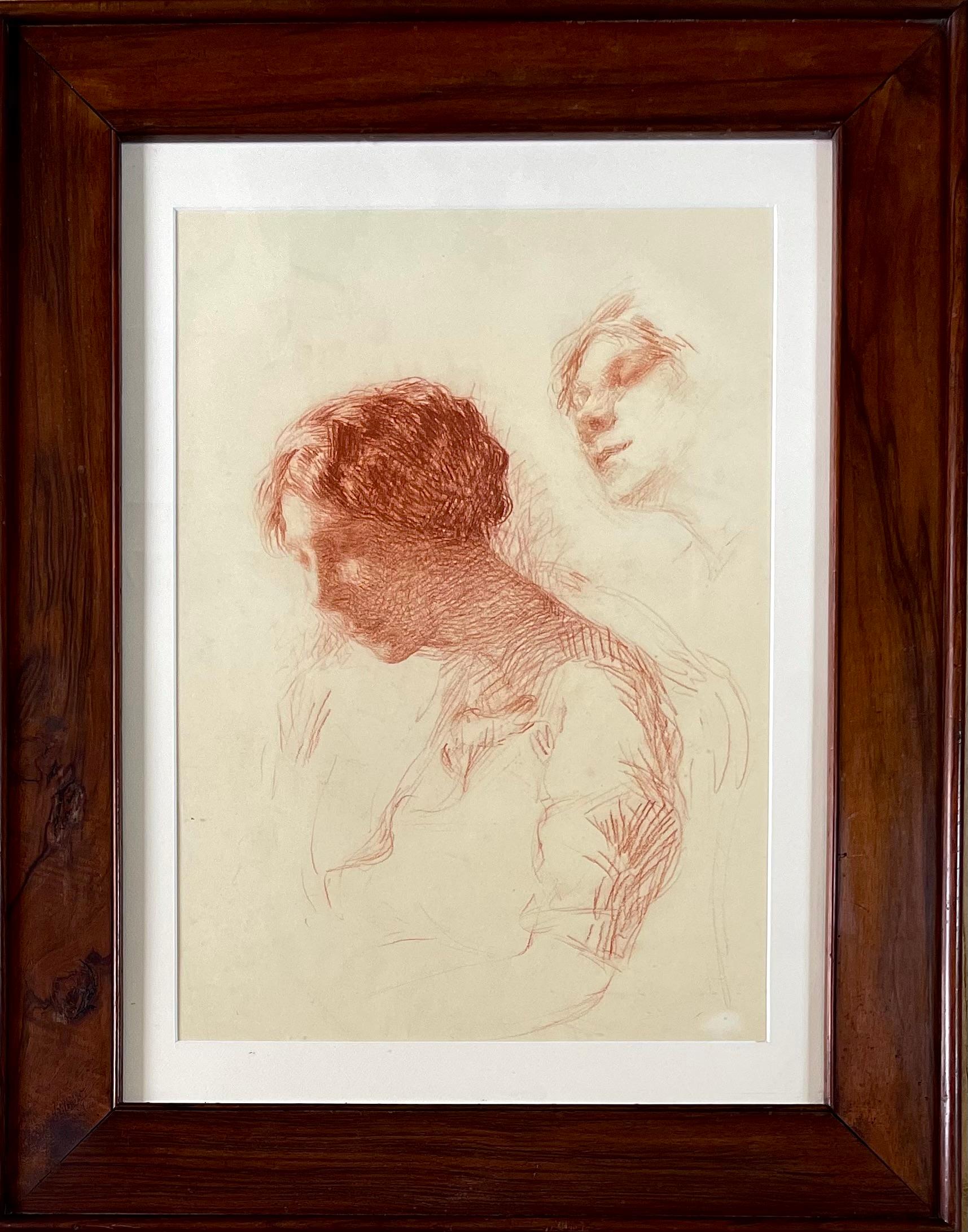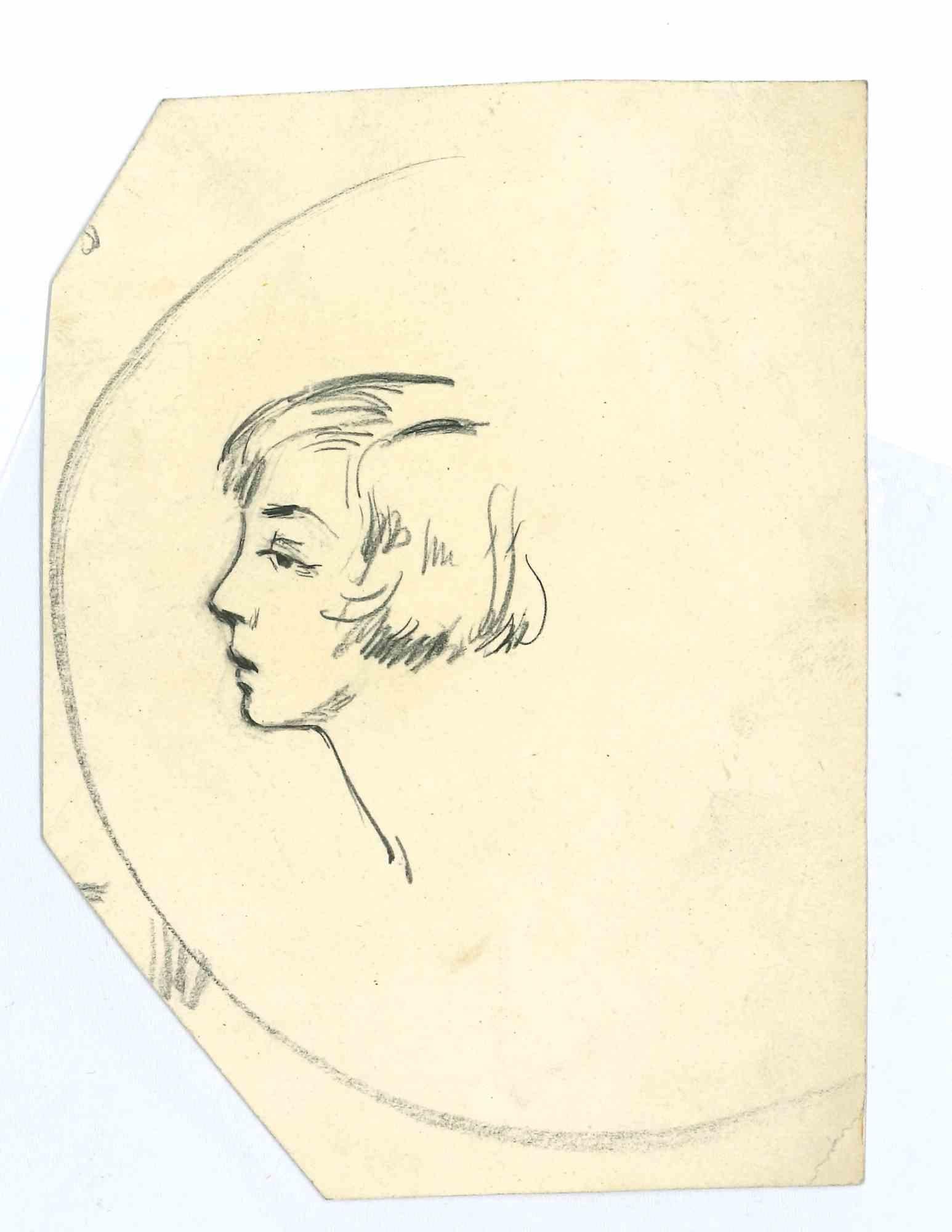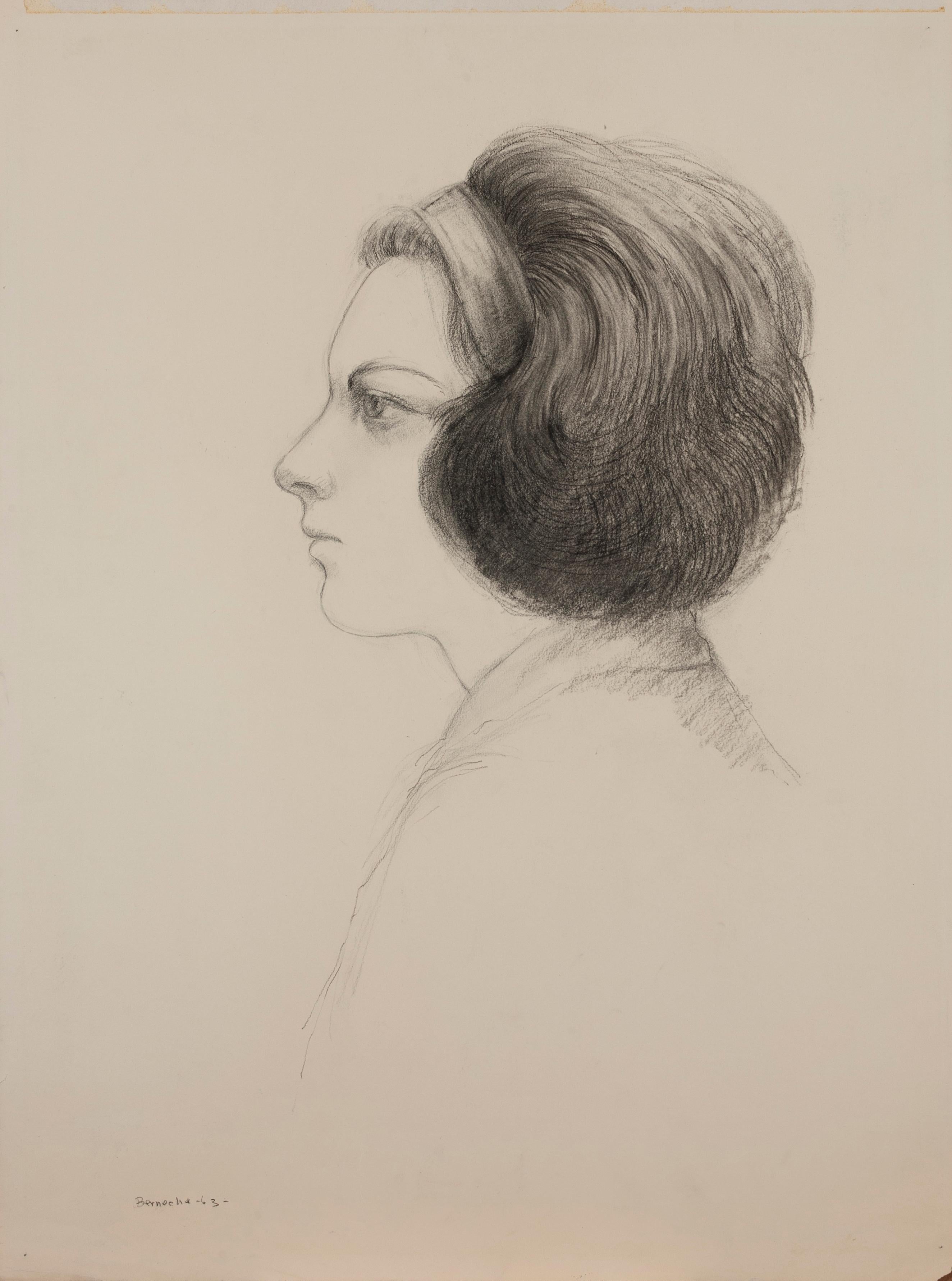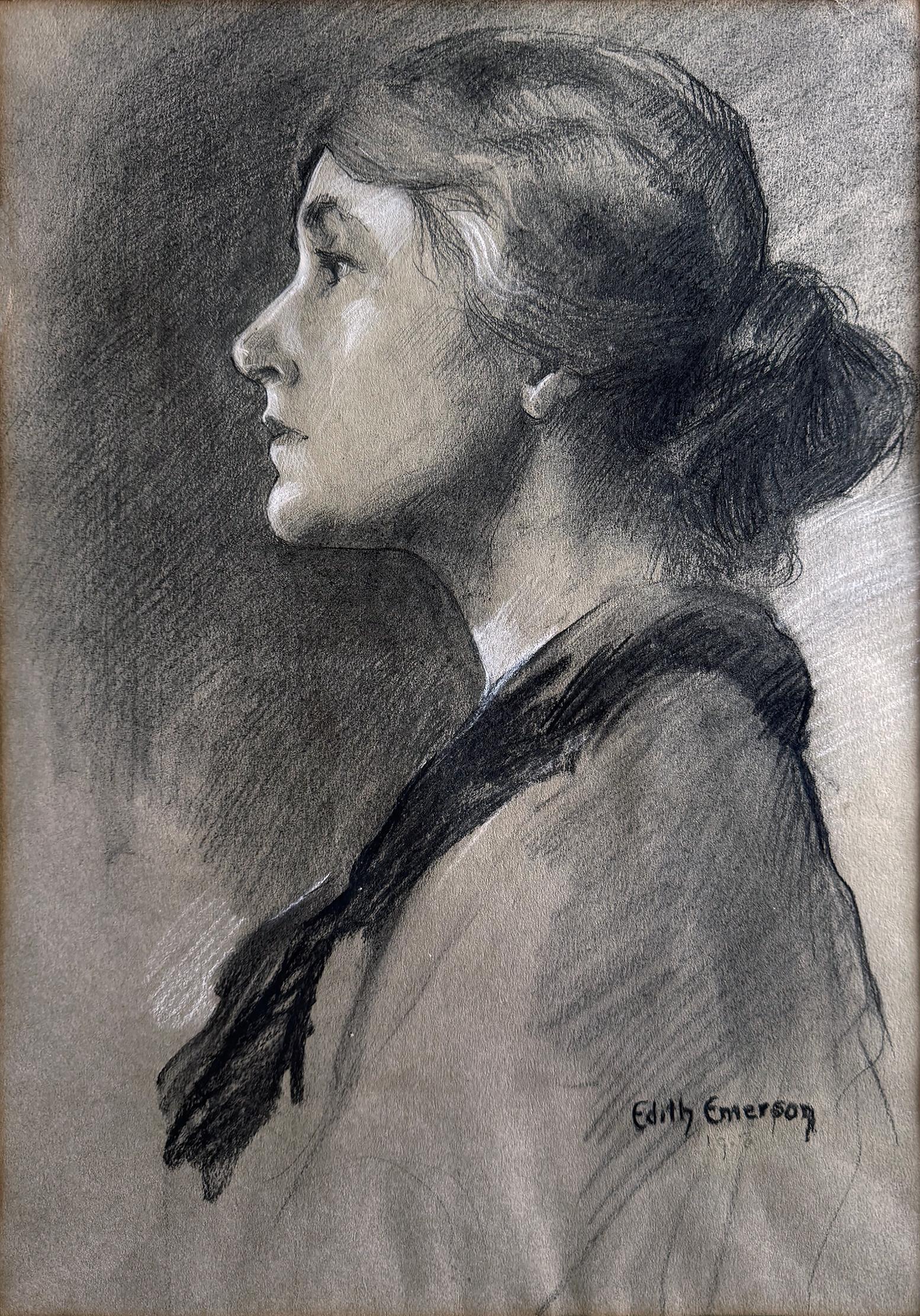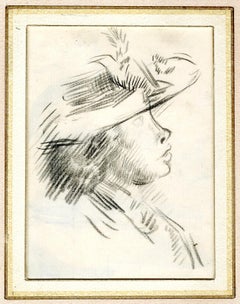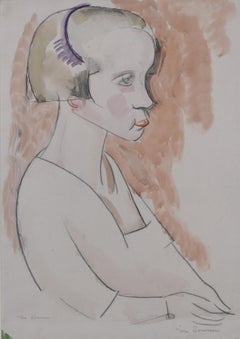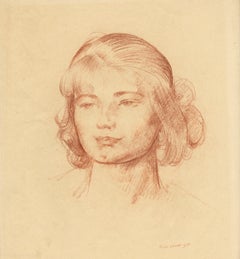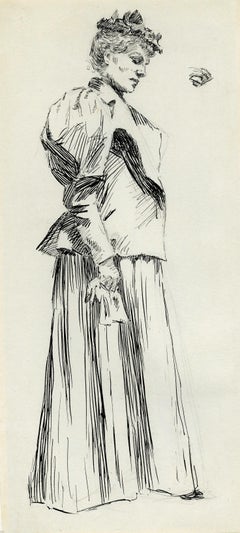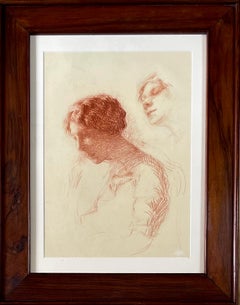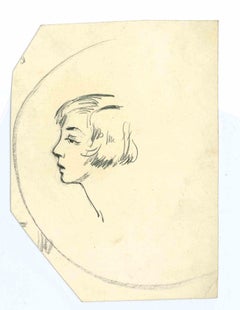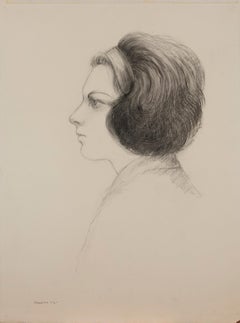Items Similar to Young Lady in Profile
Want more images or videos?
Request additional images or videos from the seller
1 of 8
Harrison M. FisherYoung Lady in Profilec. 1915
c. 1915
$1,500
£1,139.37
€1,312.94
CA$2,112.37
A$2,341.88
CHF 1,230.75
MX$28,660.72
NOK 15,370.78
SEK 14,427.02
DKK 9,800.31
About the Item
Young Lady in Profile (Dorothy Gibson)
Graphite on paper, c. 1915
Signed lower right (see photo).
The sitter for this drawing, along with a huge number of Harrison Fisher’s works, is the model, turned actress, Miss Dorothy Winifred Gibson (1889-1946).
She was one of the lucky ones who survived the sinking of the Titanic in 1912. There is an in depth biographical sketch available on Wiki.
"Dorothy Winifred Gibson (1889-1946) is arguably one of the most fascinating women of the twentieth century. Her story is more than deserving of its own film or TV show and yet, if it was to ever appear on the screen, it would be in serious danger of being criticised as ‘too unbelievable’ or ‘farfetched’. But believe me, readers, everything I am about to tell you about Dorothy Gibson is true...
Early Life
Dorothy Winifred Gibson (originally Dorothy Winifred Brown, before her father died when she was three years old and her mother remarried), was born in New Jersey on 17 May 1889. Between 1906 and 1911 (aged 17-22), she appeared on stage as a singer and dancer in a number of theatre and vaudeville productions, and in 1909 she began modelling for Harrison Fisher, a famous commercial artist. Dorothy soon became Fisher’s favourite muse, and her image was seen regularly on postcards, merchandising products and even on the covers of magazines like Cosmopolitan. During this time, Dorothy met and married a pharmacist named George Henry Battier Jr, but the couple soon separated and were divorced by 1913.
As early as 1911, Dorothy began appearing in movies, starting out as an extra but soon taking the leading roles in a series of films by Éclair Studios. Praised for her natural acting style and comedic flair, she was a huge hit – and arguably the first actress to be promoted as a star in her own right.
Surviving the sinking of the RMS Titanic
On 17 March 1912, after starring in a string of movies, Dorothy and her mother, Pauline, took a trip to Europe – but after a few weeks Dorothy was called back to America by the studio to start working on a new series of films. Dorothy and her mother were in Paris when they booked their tickets on the maiden voyage of the RMS Titanic, and boarded at Cherbourg on 10th April.
On the night the ship sank, Dorothy had ‘spent a pleasant Sunday evening playing bridge with a couple of friendly New York bankers’ (her words, in an interview with the New York Dramatic Mirror). Despite the request of a steward for them to finish, they carried on with their game and it was not until about 11:40pm that Dorothy returned to the stateroom she shared with her mother. It was at that point that she felt ‘a long drawn, sickening crunch’ and, while not exactly alarmed, she decided nonetheless to investigate. Quickly noticing that the deck was ‘lopsided’, she rushed back to her room to fetch her mother, and the pair returned to the boat deck. Dorothy and her mother escaped from the ship on the first lifeboat launched (number 7), and given how quiet it was on the boat deck at the time, she asked her bridge partners to join them.
However, events took a turn for the worst when a hole was found in the bottom of the lifeboat, causing icy cold water to rush in and almost flood the boat. Luckily, though, Dorothy explained, ‘this was remedied by volunteer contributions from the lingerie of the women and the garments of men.’
It is hard for us now to imagine the terrors of that night – and the emotional damage it caused to those who survived. After the event, Dorothy told the Moving Picture World, ‘I will never forget the terrible cry that rang out from people who were thrown into the sea and others who were afraid for their loved ones.’ Unbelievably, though, Dorothy was to re-enact the experience a mere five days after it happened, when she starred in the first film about the disaster. It was a silent movie, called Saved From The Titanic, and was actually hugely successful and the first of many hit films about the sinking. In the movie, Dorothy even wore the same clothes she had been wearing when the ship sank – a white silk dress underneath a cardigan and polo coat.
Shortly after the release of Saved from the Titanic Dorothy gave up acting.
An affair to remember
At the same time as her movie career was taking off, Dorothy began a six-year affair with one of the studio’s producers, the married movie tycoon Jules Brulatour who was 19 years her senior. In fact, it was Brulatour who told Dorothy to cut her European trip short and return to America to make a new series of films. He was also one of the producers on Saved from the Titanic, so we can assume he was at least partially responsible for Dorothy having to relive the nightmare so soon after it happened.
The affair was made public in 1913, when Dorothy accidentally struck and killed a man while driving Brulatour’s car. During the court case that followed, the press learned that Dorothy was Brulatour’s mistress and, although he and his wife had already separated, the humiliation of the whole thing caused Mrs Brulatour to sue him for divorce. This was finalised in 1915 and, in order to preserve his reputation, Brulatour married Dorothy in 1917.
However, the marriage was short-lived, and within two years the couple had separated. The more sceptical might argue that perhaps the marriage failed because it lacked the spark and excitement it had had when it was a secret (or, perhaps, because of a little thing called karma), but the original Mrs Brulatour also played a role in destroying the relationship that had helped to ruin hers. Indeed, Brulatour’s marriage to Dorothy infuriated her, and she started proceedings against him claiming the union was illegal, since he had obtained a divorce in Kentucky instead of New York (where he had residency). This was a long, drawn-out and complicated affair, the stress of which undoubtedly took its toll on the marriage, and it was ultimately dissolved as an invalid contract in 1919.
While Brulatour went on to marry actress Hope Hampton in 1923, Dorothy never remarried. Humiliated, she left New York for Paris, in the hopes of a fresh start and a quiet life with her mother. But Dorothy’s story doesn’t end there…
Surviving a Nazi prison
Although Dorothy’s story is by no means over when she departs America for France, the details do become a little bit more hazy. A more sympathetic account is that, when the Second World War broke out in 1939, Dorothy and her mother were actually in Florence (as they tended to split their time between Florence and Paris), and didn’t return to the relative safety of America because their ordeal on board the RMS Titanic had scarred them so. According to Dorothy, ‘I must say I never wanted to make the ocean trip to America at this time, as my mother and I were most timid on the ocean—we had been in a shipwreck—but I also never wanted to stay in Italy, but we just waited in Italy always hoping things would be better to travel.’ Following this narrative, Dorothy and her mother essentially found themselves trapped in Nazi-occupied territory, but other accounts would suggest that the decision to remain was made willingly, because the pair (led by Dorothy’s mother) had actually become Fascist sympathisers and potentially even Nazi spies.
By the spring of 1944, Dorothy had renounced her sympathies (if, indeed, she had any to begin with), but soon after was arrested as an anti-Fascist agitator and jailed in the Milan prison of San Vittore, which she described as a ‘living death’. Chances are, Dorothy would have died in that prison, were it not for the help of a double agent, Ugo Luca Osteria (‘Dr. Ugo’) who helped to smuggle her out of the prison under the pretence that she was a Nazi sympathiser and spy (I’ll leave it up to you to determine how much ‘pretence’ was needed!) The plan worked, and Dorothy escaped to Switzerland, where she was interrogated by James G. Bell, vice consul of the American consulate general. Once again, sources disagree; some say the allied authorities were never able to determine if she was a real Nazi spy, or just pretending, while others say the interrogation was more conclusive, with Bell actually deeming her ‘too stupid’ to be a spy. Either way, Dorothy was free.
Death
After the war, Dorothy returned to Paris, but the trauma of surviving both the sinking of the Titanic and a Nazi prison camp had taken its toll. She died a few months later in her hotel room, presumably of a heart attack. She was 56 years old. Her mother outlived her by 15 years and, as she grew older, grew increasingly vocal in her criticism of the Allies and in her pro-Nazi statements – which can either suggest that Dorothy herself was unfairly tarred with the same brush, or that perhaps Dorothy really did share these views, depending on which way you want to look at it."
Courtesy Holly Hewilett
Provenance:
H. Frederic Gough
- Creator:Harrison M. Fisher (1875-1934, American)
- Creation Year:c. 1915
- Dimensions:Height: 18 in (45.72 cm)Width: 14 in (35.56 cm)
- Medium:
- Movement & Style:
- Period:
- Condition:Original Condition.
- Gallery Location:Fairlawn, OH
- Reference Number:Seller: FA35591stDibs: LU14015162362
About the Seller
5.0
Recognized Seller
These prestigious sellers are industry leaders and represent the highest echelon for item quality and design.
Platinum Seller
Premium sellers with a 4.7+ rating and 24-hour response times
Established in 1978
1stDibs seller since 2013
809 sales on 1stDibs
Typical response time: <1 hour
Associations
International Fine Print Dealers Association
- ShippingRetrieving quote...Shipping from: Fairlawn , OH
- Return Policy
Authenticity Guarantee
In the unlikely event there’s an issue with an item’s authenticity, contact us within 1 year for a full refund. DetailsMoney-Back Guarantee
If your item is not as described, is damaged in transit, or does not arrive, contact us within 7 days for a full refund. Details24-Hour Cancellation
You have a 24-hour grace period in which to reconsider your purchase, with no questions asked.Vetted Professional Sellers
Our world-class sellers must adhere to strict standards for service and quality, maintaining the integrity of our listings.Price-Match Guarantee
If you find that a seller listed the same item for a lower price elsewhere, we’ll match it.Trusted Global Delivery
Our best-in-class carrier network provides specialized shipping options worldwide, including custom delivery.More From This Seller
View AllSketch of a woman's head in profile
By Sir William Orpen
Located in Fairlawn, OH
Sketch of a woman's head in profile
Graphite on paper, c. 1900-1910
Unsigned
Condition: Excellent
Tiny tear upper right near hinge (repaired and bearly visible)
Sheet size: 4 5/8 x 3...
Category
1910s Impressionist Figurative Drawings and Watercolors
Materials
Graphite
Girl in Profile
By William Sommer
Located in Fairlawn, OH
Girl in Profile
Lithographic crayon and watercolor on thin wove paper, c. 1930
Signed twice in pencil (see photos)
Provenance: Estate of the Artist
Edward Somme...
Category
1930s American Modern Figurative Drawings and Watercolors
Materials
Watercolor
Head of a Woman (Margaret)
By Leon Kroll
Located in Fairlawn, OH
Head of a Woman (Margaret)
conte on wove paper, 1925
Signed and dated lower right
Annotated "Margaret" in ink verso
A portrait of Margaret Cassidy Manship ( d. 2012), daughter in law...
Category
1920s Ashcan School Figurative Drawings and Watercolors
Materials
Conté
Standing Woman in Profile
By Frederick Carl Frieseke
Located in Fairlawn, OH
Standing Woman in Profile
Pen and ink drawing, c. 1900
Unsigned
Estate authentication verso by Frances Frieseke Kilmer (Mrs. Kenton Kilmer, 1914-1998) (see photo)
Condition: Excellen...
Category
Early 1900s American Impressionist Figurative Drawings and Watercolors
Materials
Ink
Portrait of a resting young lady (Marjorie Organ)
By Robert Henri
Located in Fairlawn, OH
Portrait of a resting young lady (Marjorie Organ)
Black chalk on paper. c. 1907
signed in ink by Henri's nephew, John C. LeClair, the executor of the Henri estate
"Robert Henri JLC"
Note: The sitter for this portrait is depicted in two drawings of similar size, illustrated in Chapellier Galleries Inc., Robert Henri 1865-1929, 1976, nos. 15 & 16.
Please see the attached photo of Marjorie Organ, Henri's second wife
Condition: Excellent
Image/Sheet size: 10 3/8 x 7 1/2 inches
Provenance: Estate of the Artist
John C. LeClair, Estate Adminitrator
Private Collection, Pawling, New York
Biography
Robert Henri was born Robert Henry Cozad in Cincinnati, Ohio, on June 24, 1865, the son of a professional gambler and real estate developer. The family lived in Nebraska and Colorado, but fled east when the father shot and killed a rancher over a land dispute and was indicted for manslaughter. They changed their last name because of the ensuing scandal and eventually settled in Atlantic City, New Jersey, during the early 1880s.
In 1886 Henri enrolled at the Pennsylvania Academy of the Fine Arts in Philadelphia, where he studied under Thomas Anshutz, Thomas Hovenden...
Category
Early 1900s American Impressionist Figurative Drawings and Watercolors
Materials
Graphite
Portrait de femme en buste, de profil a gauche, un tres large ruban noir du cou
By Paul César Helleu
Located in Fairlawn, OH
Portrait de femme en buste, de profil a gauche, un tres large ruban noir du cou, Mme Marthe Letellier
Drypoint, 1900-1901
Signed in pencil lower left (see photo)
Titled in pencil low...
Category
Early 1900s Impressionist Figurative Prints
Materials
Drypoint
You May Also Like
Study of young woman in profile
By Ernest Laurent
Located in PARIS, FR
Ernest LAURENT
Gentilly 1859 - Bièvres 1929
Study of young woman in profile
Red chalk
Circa 1900
80 x 63 cm framed
54 x 39 sheet
Beautiful antique frame in natural wood, probabl...
Category
Early 20th Century Post-Impressionist Portrait Drawings and Watercolors
Materials
Chalk
The Profile of Woman - Original Drawing by Micheline Resco - Mid 20th Century
Located in Roma, IT
The Profile of Woman is an Original Drawing in pencil on creamy-colored paper realized by Micheline Resco in the mid-20th century.
Good conditions.
...
Category
Mid-20th Century Modern Figurative Drawings and Watercolors
Materials
Pencil
Value Study of Woman's Head in Profile
Located in Columbia, MO
Jerry Berneche (1932 - 2016) was a painter and draftsman of representational scenes and portraits featuring extraordinary color work and extremely detailed mark-making. Locally he is...
Category
20th Century American Realist Figurative Drawings and Watercolors
Materials
Charcoal, Graphite
woman in profile oil on canvas painting portrait
Located in Barcelona, Barcelona
Alexandre Siches (1921-2009) - Woman in profile - Oil on canvas
Oil measures 35x27 cm.
Frameless.
Alexandre Siches Piera (1921-2009)
Catalan painter with an innate capacity for dra...
Category
1960s Impressionist Portrait Paintings
Materials
Canvas, Oil
$808 Sale Price
32% Off
Charcoal Portrait of a Lady Profile - Partner of Violet Oakley - Gay Interest
Located in Miami, FL
Academic study in profile of a high bow sitter on gray paper with white highlights.
Signed lower right and dated faintly 1916
Edith Emerson (July 27, 1888 – November 21, 1981) was a...
Category
1910s Academic Portrait Drawings and Watercolors
Materials
Paper, Charcoal
Elegant Woman Profile - Original Etching, Printed signature
By Paul César Helleu
Located in Paris, IDF
Paul César Helleu
Elegant Woman Profile, 1913
Original Etching
Printed signature
On vellum 26 x 20 cm (c. 10.5 x 8 inch)
Very good condition, light defects at the edge of the sheet
Category
1890s Art Nouveau Portrait Prints
Materials
Etching
